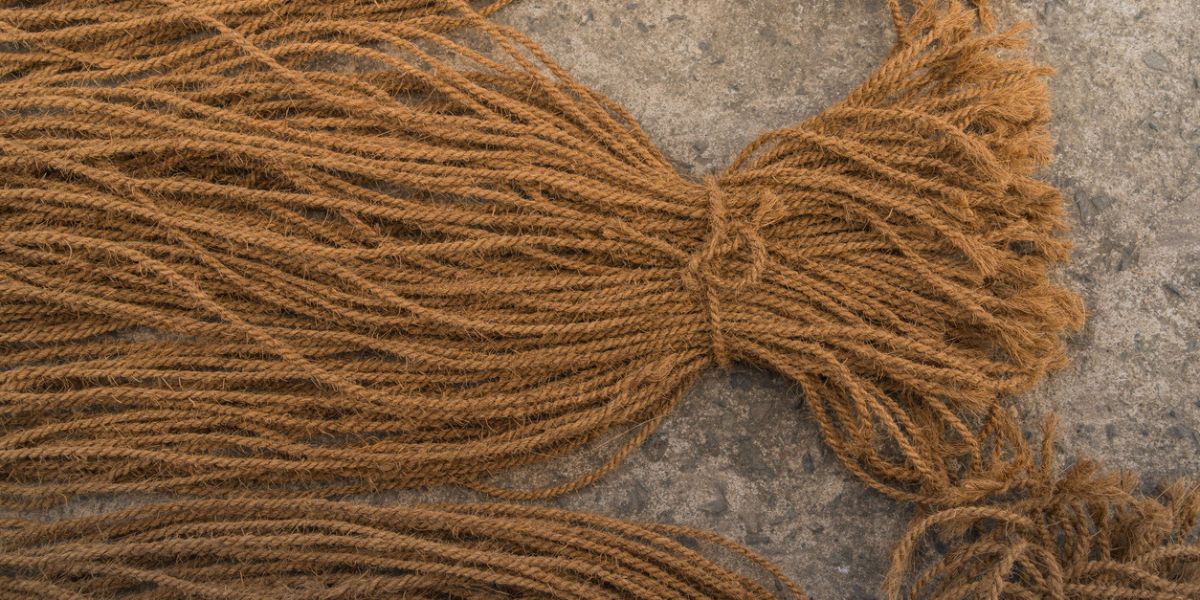Published Nov 07, 2025 | 9:00 AM ⚊ Updated Nov 07, 2025 | 9:00 AM

Coir made from coconut husk. (iStock)
Synopsis: Kerala’s age-old coir industry is poised for a scientific makeover with the Directorate of Coir Development, in collaboration with the NCRMI, set to roll out a pioneering project to replace the traditional, water-intensive retting process with a sustainable microbial alternative that uses naturally occurring bacteria and yeasts to efficiently separate fibre.
Kerala’s age-old coir industry — the state’s pride and a livelihood source for over 1.5 lakh workers, most of them women — is poised for a scientific makeover.
The Directorate of Coir Development, in collaboration with the National Coir Research and Management Institute (NCRMI), is set to roll out a pioneering project titled ‘Harnessing Indigenous Microbiota: Developing a Product for Ret Liquor Recycling’.
The initiative aims to replace the traditional, water-intensive retting process with a sustainable microbial alternative that uses naturally occurring bacteria and yeasts to separate fibre efficiently — marking a crucial step towards greener coir production in Kerala, the cradle of India’s white fibre industry.
In a major step toward making the traditional coir industry more sustainable, it was the Directorate of Coir Development, the nodal agency to implement the schemes of the coir industry, which forwarded a proposal from the NCRMI for the unique project.
The project, sanctioned with a grant of ₹30.96 lakh under the Centres of Research and Development in Coir Technology scheme, aims to turn one of the industry’s biggest environmental challenges into a solution.
Coir production involves retting — a process where coconut husks are soaked in water for several weeks to extract the fibre. This process generates ret liquor, a dark effluent rich in organic matter and sulphur compounds that can pollute nearby water bodies.
The new project seeks to recycle this waste using naturally occurring microorganisms from traditional retting pits.
The project’s first objective is to isolate and identify native microbes capable of breaking down harmful substances such as polyphenols, lignocellulosic biomass, and sulphur compounds — all of which contribute to water pollution and foul odour.
Advanced MALDI-TOF (Matrix-assisted laser desorption ionisation-time of flight mass spectrometry — a potential tool used for the identification and diagnosis of microorganisms) technology will be used to accurately identify these microbial strains.
Once identified, NCRMI scientists will develop a microbial consortium — a carefully balanced mix of these microbes — designed to degrade the pollutants effectively.
Researchers also plan to create a powdered or encapsulated form of the consortium, making it easy to store, transport, and use.
Finally, the impact of this bio-solution on ret liquor will be tested and evaluated for large-scale application in the field.
If successful, the innovation could help the coir industry drastically reduce water pollution, making the age-old process cleaner and more environmentally friendly.

Traditional extraction of coir fibre
courtesy. (Coir Board)
Kerala, the cradle of India’s coir industry, continues to hold its position as the country’s undisputed leader in coir production and exports.
The state accounts for 61 percent of India’s coconut production and over 85 percent of coir products, making the sector one of its most vital traditional industries.
Nearly 1.5 lakh workers, 80 percent of them women, depend on coir for their livelihood. The industry functions through three major segments — fibre extraction, spinning, and product manufacturing.
While the first two are largely operated by cooperatives, the manufacturing and export sectors are dominated by private and public enterprises.
Coir not only supports livelihoods but also contributes significantly to Kerala’s export earnings. However, this golden fibre industry faces mounting challenges.
According to the Economic Review 2024, the sector is weighed down by low wages, scarcity of raw materials, outdated production methods, and the absence of efficient procurement models.
In response, the government has rolled out policies aimed at technological modernisation, price regulation, diversification, and developing eco-friendly, self-sustaining units capable of competing in global markets.
One of the most pressing issues lies in the traditional retting process. Retting involves soaking husks in backwaters for 10 to 12 months, a labour-intensive and time-consuming process that causes significant water pollution and poses occupational health hazards.
Yet, this natural process also yields high-quality fibre with a distinctive golden hue — a paradox that continues to challenge both environmentalists and the industry.
“For decades, traditional coconut husk retting sustained our coir industry but at a heavy ecological price,” said an official from the Directorate of Coir Development.
“The old method, which involved soaking husks in ponds and backwaters for months, released tannins, phenolic compounds, and organic wastes that turned water bodies black, depleted oxygen, and choked aquatic life. It demanded enormous quantities of water, consumed time and labour, and often resulted in inconsistent fibre quality,” the official added.
According to him, microbial retting has changed that paradigm.
“By using a consortium of beneficial bacteria and yeasts — like Pseudomonas, Bacillus, and Saccharomyces — we can now separate fibres efficiently within days in controlled tanks. This process slashes water use, prevents backwater pollution, and produces cleaner, stronger fibres. It’s faster, cheaper, and far more sustainable,” the official said.
“With innovations like Coirret, developed by the Central Coir Research Institute, we are proving that technology and tradition can coexist. Microbiota-based retting represents not just a scientific breakthrough but a moral shift toward responsible production—protecting Kerala’s backwaters while revitalising its signature industry,” the official added.
If successful, Kerala’s microbial retting initiative could redefine the very foundation of its coir legacy — transforming a centuries-old, water-intensive craft into a symbol of sustainable innovation.
By harnessing the power of native microbes, the state is not only addressing one of its most persistent environmental challenges but also reaffirming its commitment to blending science with tradition.
(Edited by Muhammed Fazil.)

